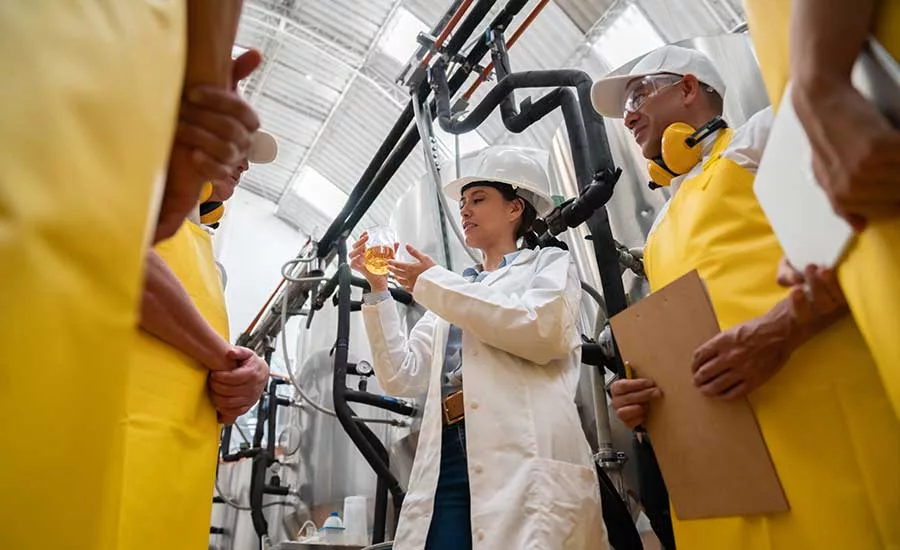Considerations for a Successful Food Safety Inspection

Image credit: Andresr/E+ via Getty Images
Food safety is fast becoming a crucial function of every sector of the food industry. The reason is simple: It is estimated that over 600 million people suffer from foodborne illness every year. This statistic translates to roughly one in ten individuals being affected by foodborne illness, and almost 420,000 deaths attributed to the same. It is estimated that over $110 billion USD are lost through medical expenses and productivity costs due to unchecked foodborne illnesses. The only way to prevent these illnesses, deaths, and their associated financial burdens is by implementing systems to ensure that all food that is produced is certifiably safe. This is where food safety inspections have come into the forefront.
Food safety inspections have been conducted by third-party inspectors, internal auditors, and government regulators for decades, but it is prudent to understand the different kinds of inspections that are performed. In recent years, food safety inspections have been associated with the analysis of a food sample; this ranges from microbiological testing and chemical testing to heavy metal detection. This kind of food sampling and testing can be used for adhering to specific import and export regulations.1 Traditionally, however, a food safety inspection is generally described as a systematic monitoring of food safety processes throughout the supply chain to identify any deviations and/or non-conforming products in a timely manner. Food safety inspections are affected by an array of different factors, such as the skill of auditors and inspectors, the standard of criteria used in inspections, risk assessment, and even employee training, in some cases.
With the broad number of factors involved in conducting a successful and efficient food safety inspection, all food safety inspectors, regardless of experience, should take into consideration some key pointers before conducting an inspection.
In-Depth Understanding of Food Safety Inspection Criteria
Food safety inspection criteria can differ considerably, depending on various factors:
- Legal requirements for the country of inspection
- External food safety management system (FSMS)
- Client requirements.
It is the inspector's responsibility to understand the national legal requirements for food safety where the inspection is to take place, as these generally take precedence over any external FSMS requirements. Failure to adhere to legal requirements could lead to hefty fines and, in some cases, a facility shutdown. Ideally, any external FSMS inspection criteria must also include legal requirements in the checklist, and the inspector should have an acute understanding of each clause and what kind of deviations could occur. Inspectors gain insight into the inspection criteria by previewing the inspection checklist prior to any physical or virtual inspections.
It is not feasible to expect a food safety inspector to have expert-level knowledge of each and every process at a particular site. In some cases, subject matter experts may accompany inspectors to help clarify their understanding of the system they are inspecting.
Soft Skills—Time Management, Communication, and Interpersonal
Looking for quick answers on food safety topics?
Try Ask FSM, our new smart AI search tool.
Ask FSM →
A food safety inspector should possess a skillset that enables them to conduct an effective food safety inspection. Technical skills are essential, but soft skills are important, as well. Unfortunately, this latter skillset is often put on the backburner. Skills such as effective communication, work ethic, and time management are essential to ensure a seamless and successful inspection:
- Communication. Conducting opening meetings before commencing a food safety inspection is an integral part of the inspection process. Effectively communicating all information about the inspection, such as criteria, time required, names/backgrounds of the inspectors involved, etc., helps ensure that the inspection can be carried out without a hitch, and that any probing questions will be answered with diligence.
- Time management. Once an inspection begins, it is unfortunately easy to lose a significant amount of time to interpreting vague system clauses. Without effective time management, an inspector could lose valuable time that could have been redirected to other parts of the inspection. Thus, allocating a specific amount of time to each criterion in a food safety inspection is critical to ensure that the inspection is completed in a timely and in-depth manner.
- Effective interpersonal skills. A little-known soft skill that is surprisingly important for food safety inspectors, interpersonal skills are crucial to the inspection process. Effective inspection involves speaking to employees to assess training effectiveness, process knowledge, and other information regarding the activities within the establishment. When the employees feel comfortable throughout the interview process, it is considerably easier to gain this information. It is common for employees to feel immense pressure during external inspections, which may lead to intentional or unintentional concealment of information relevant to the inspection. This can be avoided through the use of effective interpersonal skills.
Mode of Inspection
With the advent of the COVID-19 pandemic, the food safety inspection landscape changed drastically. Keeping in mind COVID-friendly measures such as social distancing, quarantine, and isolation concepts, the methodology of food safety inspections and how they are carried out has changed in the past three years. The concept of a virtual audit was practically unheard of before the pandemic, but it has now become a useful tool for supplementing food safety inspections. With the growth of audit/inspection companies investing in the development of new and improved applications, an increasing number of audits and inspections are being conducted virtually, with the help of technology.
Virtual inspections take place through an audio/video application and allow the inspector to audit a particular facility, or elements of the facility, without actually visiting it. Virtual inspections are often reserved for "low-risk" facilities that have a good record of in-person inspections. They allow inspectors to conduct inspections in a quick and effective manner, without having to worry about travel restrictions. Virtual inspections also allow multiple inspectors to conduct an inspection with ease at the same time, and for information regarding the inspection to be recorded in real time.
A few disadvantages of virtual inspections have been noted by inspectors; notably, the requirement for an internet connection for conducting real-time inspections. This may not always be feasible, especially in areas such as warehouses or cold rooms, or in remotely located factories/facilities.
Offline inspections are the current benchmark for food safety inspections, although this is rapidly changing. Globally recognized FSMSs such as Safe Quality Food Institute (SQFI) and Brand Reputation Compliance Global Standard (BRCGS) have included online inspections and audits as part of their process. Major corporations have also included virtual internal audits as an easy and accessible method of conducting effective food safety inspections in a timely manner.
The Importance of Inspections
Food safety inspections should be considered an integral part of the operation of any food industry sector. They ensure the longevity of an organization as a whole and that all products being manufactured or released by an establishment are safe, thereby helping build customer trust. In the constantly evolving technological landscape of the 21st century, it is prudent to understand that food safety inspections and their methodologies should adapt to become more effective and efficient. It could be mean the difference between a safe product and a foodborne illness outbreak.
References
- World Health Organization. "Food Safety." May 19, 2022. https://www.who.int/news-room/fact-sheets/detail/food-safety.
- Barnes, J., H. Whiley, K. Ross, and J. Smith. "Defining Food Safety Inspection." International Journal of Environmental Research and Public Health 19, no. 2 (2022): 789. doi: https://doi.org/10.3390/ijerph19020789.
- Chestnut, T. "The Spectrum of Food Safety Audits: Remote Audits, On-Site Audits and the Future of Real-Time Monitoring." NSF International. October 2020. https://www.nsf.org/in/en/news/spectrum-food-safety-audits-remote-audits-on-site-audits-future-real-time-monitoring.









